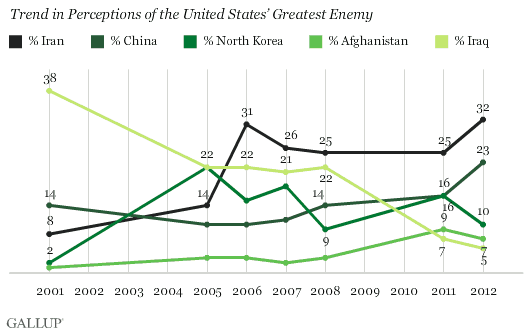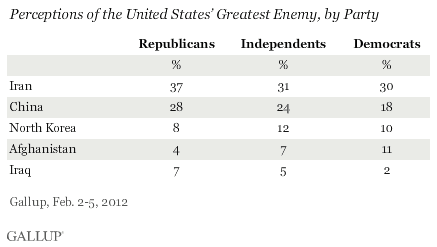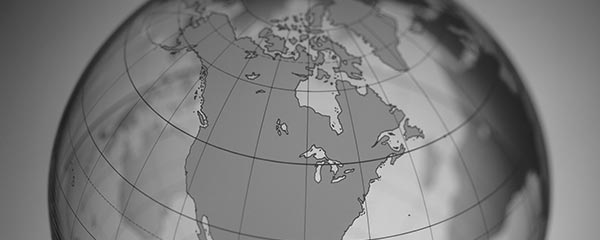PRINCETON, NJ -- Americans most frequently mention Iran when asked to name the country they consider to be the United States' greatest enemy, and the 32% who do so is up from 25% in 2011. China is second on the list, with significantly fewer Americans mentioning North Korea, Afghanistan, and Iraq -- the countries that round out the top five.
![What one country anywhere in the world do you consider to be the United States’ greatest enemy today? [OPEN-ENDED] February 2012 results](http://content.gallup.com/origin/gallupinc/GallupSpaces/Production/Cms/POLL/xfnjumdhuk63enedfvg3_w.gif)
These results are based on Gallup's annual World Affairs poll, conducted Feb. 2-5, 2012. The contour of responses to this "greatest enemy" question has changed substantially over the seven times Gallup has asked it since 2001. Americans most frequently mentioned Iraq as the United States' greatest enemy in 2001 -- before the U.S. invaded the country and removed Saddam Hussein from power -- and in 2005, when it tied North Korea. Iran has topped the list in each of the five surveys since.
More Americans Now Name Iran Greatest Enemy
The 32% of Americans who name Iran is the highest reading Gallup has measured for that country, and is up from 25% last year.
More Americans mention China as the United States' greatest enemy (23%) this year than at any point in the 11-year history of the question, likely reflecting at least in part Americans' concern over China's global economic influence. Last year, China tied North Korea for second place, but mentions of North Korea have declined, leaving China alone in second place in 2012.
Also, over the last two years, Americans have been modestly more likely to mention Afghanistan as the nation's greatest enemy than in years prior, perhaps partly because U.S. attention has turned away from Iraq. Mentions of Iraq have dropped significantly since 2008.

Republicans More Likely Than Democrats to Name Iran and China
Iran rates as the top enemy among all party groups, though Republicans are slightly more likely than independents or Democrats to mention Iran. Republicans are also more likely to mention China than are Democrats.
Democrats are more likely to mention Afghanistan as the nation's greatest enemy, although this difference is not large.

Implications
Iran's continued public announcements of its growing nuclear capabilities, its threats of war with U.S. ally Israel, and the possibility that Iran could disrupt the flow of oil out of the Middle East and further affect domestic oil and gas prices no doubt all contribute to Americans' negative views of the country.
Americans are now more likely to name China as the greatest U.S. enemy than at any time over the past 11 years, although probably for different reasons than is the case for Iran. Americans now view China as the world's greatest economic power, and China's impact on the United States' economic situation may be the driving force behind Americans' increasingly apprehensive views of that country.
Americans' views of Iran as the greatest enemy of the United States align with the highly unfavorable ratings they give to the country. Iran's 87% unfavorable rating is the most negative for any country measured in Gallup's February World Affairs survey.
On the other hand, while China is second on Americans' greatest enemy list, it has a significantly more positive image than Iran, North Korea, Afghanistan, or Iraq, the four countries that join China in constituting the top five on Americans' greatest U.S. enemies list. Americans give China a 41% favorable rating, while North Korea, Afghanistan, and Iraq have favorable ratings of 24% of lower.
Survey Methods
Results for this Gallup poll are based on telephone interviews conducted Feb. 2-5, 2012, with a random sample of 1,029 adults, aged 18 and older, living in all 50 U.S. states and the District of Columbia.
For results based on the total sample of national adults, one can say with 95% confidence that the maximum margin of sampling error is ±4 percentage points.
Interviews are conducted with respondents on landline telephones and cellular phones, with interviews conducted in Spanish for respondents who are primarily Spanish-speaking. Each sample includes a minimum quota of 400 cell phone respondents and 600 landline respondents per 1,000 national adults, with additional minimum quotas among landline respondents by region. Landline telephone numbers are chosen at random among listed telephone numbers. Cell phone numbers are selected using random-digit-dial methods. Landline respondents are chosen at random within each household on the basis of which member had the most recent birthday.
Samples are weighted by gender, age, race, Hispanic ethnicity, education, region, adults in the household, and phone status (cell phone only/landline only/both, cell phone mostly, and having an unlisted landline number). Demographic weighting targets are based on the March 2011 Current Population Survey figures for the aged 18 and older non-institutionalized population living in U.S. telephone households. All reported margins of sampling error include the computed design effects for weighting and sample design.
In addition to sampling error, question wording and practical difficulties in conducting surveys can introduce error or bias into the findings of public opinion polls.
View methodology, full question results, and trend data.
For more details on Gallup's polling methodology, visit www.gallup.com.
